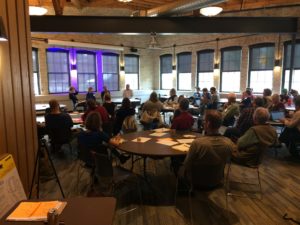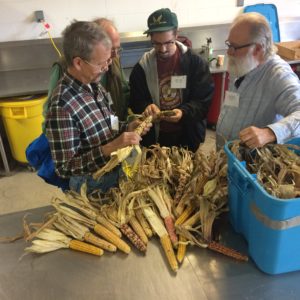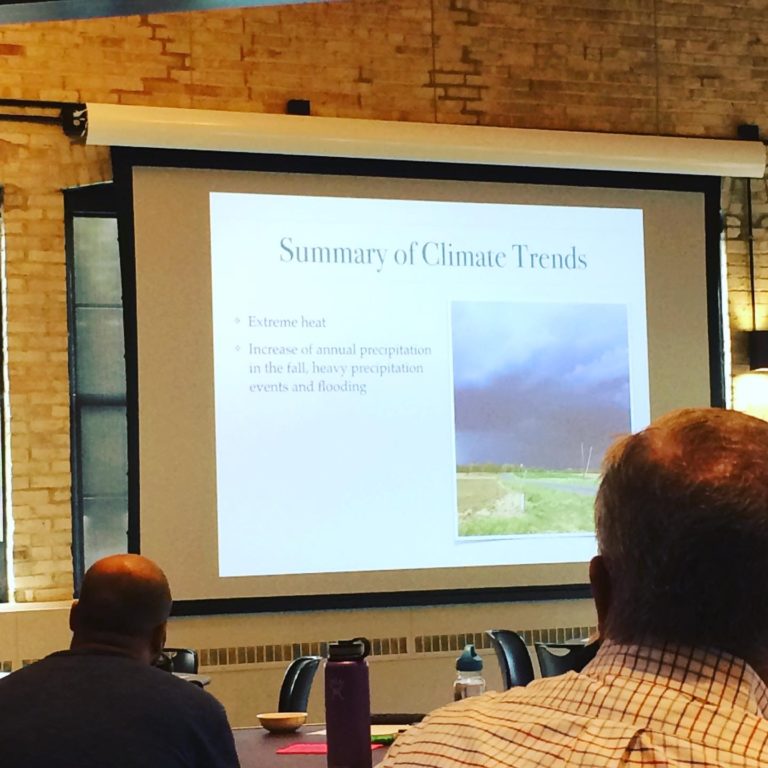
Thanks to Koby Jeschkeit-Hagen of Seed Sages for contributing this guest blog post (full bio below).
Regional connectivity between seed sectors and beyond is vital to building resilient seed communities. Although the Upper Midwest is full of skillful seeds people who are running innovative projects and companies, seed gatherings are few and far between. After record-breaking rainfall and storms throughout the growing season, this fall seemed like a perfect opportunity to convene and strategically build more momentum around seed.
On October 17-18, 2019, the first Upper Midwest Seed Summit was held at the Goodman Center and the University of Wisconsin – Madison. The event brought together representatives within seed research, production, and community programs to generate pathways of support and collaboration.

Around 50 growers, breeders, researchers, coordinators, educators, and organizers gathered to share their perspectives and identify connective focal points for future seed initiatives. During the first day there was a presentation by Organic Seed Alliance (OSA) and Seed Sages, titled: “Regional Climate Considerations for Seed Production.” This was followed by the panel, “Valuing regional, organic and specialty seed,” with regional company panelists from Nature and Nurture Seeds, Albert Lea Seed, and A.P. Whaley Seed Company. After this, a participant-driven, open-space session and a strategic exploration session were the two main activities used to gather data and insights. The next day the group explored DIY threshers, winnow techniques, and other small-scale seed processing machinery brought by participants. Throughout the two days three taste evaluations were offered for mild hot peppers, artisanal heritage grain bread, and squash by the Seed to Kitchen Collaborative.
Since this was a summit of seed minds, we explored the following questions with each other:
- What are the priority areas for collaborative work to strengthen the Upper Midwest seed system?
- Which strengths will we depend on the most to pursue these opportunities?
- Which external and internal challenges get in the way of pursuing these opportunities?
- What types of solutions will help us move past these challenges?
We found that while there are substantial obstacles that impede regional seed efforts in the Midwest, we have many more strengths and innovative solutions to circumvent those obstacles. While the Summit findings are still being compiled, this event was just the beginning of many synergistic efforts in the Upper Midwest. The planning committee acknowledges that there are many more representatives and local experts from diverse communities to include in future efforts and summits. This was a small yet sturdy step taken to kick-off momentum for wintertime planning. Many participants who attended and those who would like to attend are excited to explore the Summit’s findings for strategic steps in the Upper Midwest.
This event would not have been possible without the generous support of its many sponsors, including: Albert Lea Seed, Blooming Prairie Foundation, Ceres Trust, The Good Acre, Minnesota Department of Agriculture, Midwest Organic and Sustainable Education Services (MOSES), North Central Sustainable Agriculture Research and Education (SARE), and Willy Street Co-op.
About Seed Sages
Seed Sages is an educational endeavor that is based in the Twin Cities and offers seed services in many regional areas throughout the Midwest and beyond. We provide seed consultations, designs, trainings, and research for seed production. Our mission is to re-skill our garden and farm communities in the art of seed saving and breeding to strengthen the foundation of our local food systems: our seed systems.
About Koby Jeschkeit-Hagen
Koby is one seed saver along a long line of great teachers and breeders before her. While Seed Sages is not her daytime job, seed stewardship and biodiversity conservation is a driving force behind her work. Starting out as an intern at a small, family-owned CSA in Colorado, she has over 10 years of grounding experience at educational, research, biointensive, urban youth, and seed-saving farms across the country, including Tiny Diner (MN) and Farm, Farm Table (WI) Emandal Farm (CA), Arid Crop Seed Cache and Cuartro Puertas (NM), JD Rivers Children’s Garden (MN), Seed Savers Exchange (IA), Seeds of Change (NM), and Ecology Action (CA). With a Masters in Community and Regional Planning (Environment and Natural Resources emphasis), a PDC from the Permaculture Drylands Institute, and a permaculture teacher certificate, she draws on many approaches to share diverse seed saving, farming and community-building methods.


